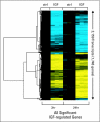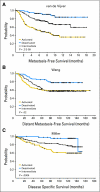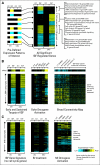Insulin-like growth factor-I activates gene transcription programs strongly associated with poor breast cancer prognosis
- PMID: 18757322
- PMCID: PMC2654368
- DOI: 10.1200/JCO.2007.13.4429
Insulin-like growth factor-I activates gene transcription programs strongly associated with poor breast cancer prognosis
Abstract
Purpose: Substantial evidence implicates insulin-like growth factor-I (IGF-I) signaling in the development and progression of breast cancer. To more clearly elucidate the role of IGF in human breast cancer, we identified and then examined gene expression patterns of IGF-I-treated breast cancer cells.
Methods: MCF-7 cells were stimulated with IGF-I for 3 or 24 hours and were profiled for greater than 22,000 RNA transcripts. We defined an IGF-I signature pattern of more than 800 genes that were up- or downregulated at both time points. The gene signature was examined in clinical breast tumors and in experimental models that represented other oncogenic pathways. The signature was correlated with clinical and pathologic variables and with patient outcome.
Results: IGF-I caused temporal changes in gene expression that were strongly associated with cell proliferation, metabolism, and DNA repair. Genes with early and sustained regulation by IGF-I were highly enriched for transcriptional targets of the estrogen receptor (ER), Ras/extracellular signal-related kinase 1/2, and phosphatidylinositol 3-kinase/Akt/mammalian target of rapamycin pathways. In three large, independent data sets of profiled human breast tumors, the IGF-I signature was manifested in the majority of ER-negative breast tumors and in a subset (approximately 25%) of ER-positive breast tumors. Patients who had tumors that manifested the IGF-I signature (including patients who did not receive adjuvant therapy) had a shorter time to a poor outcome event. The IGF gene signature was highly correlated with numerous poor prognostic factors and was one of the strongest indicators of disease outcome.
Conclusion: Transcriptional targets of IGF-I represent pathways of increased aggressiveness and possibly hormone independence in clinical breast cancers.
Figures













Comment in
-
Obesity and cancer treatment: weighing the evidence.J Clin Oncol. 2008 Sep 1;26(25):4060-2. doi: 10.1200/JCO.2008.17.4250. J Clin Oncol. 2008. PMID: 18757320 No abstract available.
References
-
- Pollak MN, Schernhammer ES, Hankinson SE: Insulin-like growth factors and neoplasia. Nat Rev Cancer 4:505-518, 2004 - PubMed
-
- Pollak M: Insulin-like growth factor physiology and cancer risk. Eur J Cancer 36:1224-1228, 2000 - PubMed
-
- Pollak M: IGF-I physiology and breast cancer. Recent Results Cancer Res 152:63-70, 1998 - PubMed
-
- Surmacz E: Function of the IGF-I Receptor in Breast Cancer. J Mammary Gland Biol Neoplasia 5:95-105, 2000 - PubMed
-
- Sachdev D, Yee D: Disrupting insulin-like growth factor signaling as a potential cancer therapy. Mol Cancer Ther 6:1-12, 2007 - PubMed
Publication types
MeSH terms
Substances
Grants and funding
LinkOut - more resources
Full Text Sources
Other Literature Sources
Medical
Molecular Biology Databases

